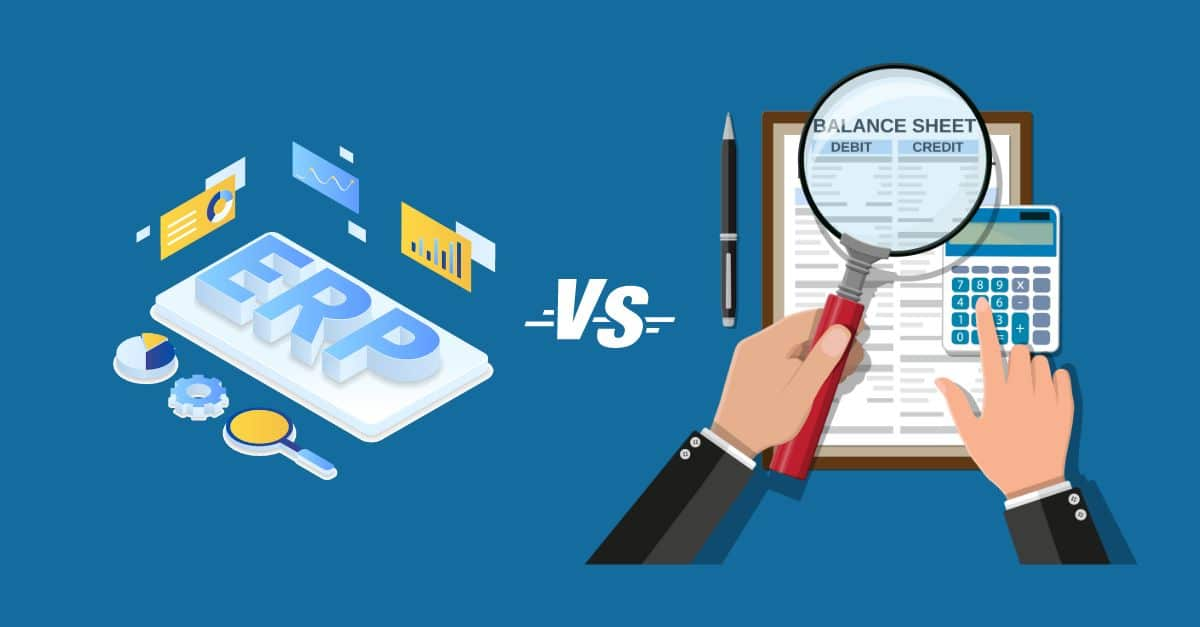Comments
- No comments found

Enterprise Resource Planning (ERP) and Accounting Software are two essential tools used by businesses to manage their financial activities and streamline their operations.
While both serve the purpose of organizing financial data, they have distinct functions and features that cater to different aspects of business management.
Typical features of accounting software include the ability to handle banking, basic revenue/sales tracking, accounts payable/receivable, and financial reporting.
Accounting is one of several modules included in enterprise resource planning (ERP) systems. Additional courses cover a wide range of topics, such as production, planning, HR, sales, buying, inventory management, warehouse management, and supply chain.
Though in the world of ERP software development "accounting software" and "ERP software" are sometimes used interchangeably, there is a difference.

Software that helps keep fundamental business operations running smoothly is becoming more important in today's complicated environment due to rising data management demands, shorter response times, and higher consumer expectations for product customisation. Adaptable features that meet the ever-changing demands of a company's sector are also essential. The same holds true for standalone financial management and accounting programs; they can't compare to comprehensive ERP systems in terms of meeting all of your demands.
There is a common misconception that ERP software and accounting software are the same. Actually, ERP software requirements include accounting and financial reporting software as subsets. Knowing the distinction is critical. We should examine it more closely.
Software for accounting purposes, such as QuickBooks, is insufficient.
Accounting and financial management software is used by almost all businesses. Compared to standalone accounting software, what makes ERP software superior?
QuickBooks, Sage, and Dynamics GP were formerly reliable accounting software options for small and medium-sized businesses. ERP software became necessary as businesses faced greater competition and customers sought faster response times and more customisation.
Banking, reporting, and accounting may be done using independent accounting software. Traditional accounting software that SMBs have used for years can't see forward.
ERP systems' accounting and financial management functions help better decision-making by providing a single source of fully integrated, real-time information across various departments. Real-time visibility throughout the enterprise may improve purchasing, production, inventory movement, and warehouse management.
QuickBooks cannot grow with your organization since it uses a proprietary database. Such independent systems were not meant to connect company-wide activities and give real-time progress metrics. Thus, compartmentalized data cannot accurately and fully represent your company's actions.
In order to help organizations expand, acquire complete visibility and control, and compete in an increasingly competitive market, an ERP system integrates financial management, supply chain, CRM, and sometimes industry-specific solutions into one comprehensive system.
ERP accounting software unifies all of your company's data into a unified database, streamlining data processing and analysis across all departments. Software for enterprise resource planning (ERP) accounting simplifies inventories and sales, finds process gaps, and increases output.
Accounting software includes a lot of functionality, but ERP software has even more.
The primary motivation for using enterprise resource planning (ERP) software for accounting is to improve the company's overall operational efficiency, scalability, and transparency.

When deciding between accounting software and enterprise resource planning (ERP), there are five factors to think about.
1. One analogy is a set of Legos
Enterprise resource planning (ERP) software has many more uses than accounting software. Accounting and financial management tools in an enterprise resource planning (ERP) system provide a bird's-eye perspective of the whole business. These tools include sales, purchasing, inventory, quality control, customer relationship management (CRM), human resources (HR), mobility, and more.
2. Industry-specific demands cannot be met by standalone accounting software.
Distribution and manufacturing organizations need burdensome third-party inventory monitoring add-ons since stand-alone accounting software lacks inventory tracking features. Enterprise resource planning systems provide distributors and manufacturers powerful inventory management capabilities. Proactive inventory management in manufacturing ERP reduces labor costs, improves decision-making speed and accuracy, and lowers stock holding costs. ERP systems improve shop floor execution management. ERP systems may manage product planning, supply chain management, BOMs, manufacturing resources, supply shipments, and more. Accounting software lacks production-control tools.
3. Bookkeeping Problems with non-GAAP compliance might arise with software and ERP systems.
The inability or difficulty to comply with GAAP standards is a software defect that many developing small and medium-sized businesses cannot afford, and this is true of many popular stand-alone accounting and ERP systems. Inquire about the software's ability to assist with GAAP compliance, tax law compliance, and financial regulatory compliance from the vendor at all times.
4. CRM and sales tools are not part of accounting software.
Managing sales and processing orders are two functions that an ERP system may provide. Oftentimes, ERP systems come with an integrated CRM module that provides easy access to up-to-date contact details and a record of all conversations. As opposed to standalone accounting software, which lacks these features.
5. The ability to access data in real-time and be mobile is restricted by accounting software.
ERP systems consolidate all financial data into one central repository. The need for separate tools to handle the needs of many departments is eliminated by ERP systems, which provide an integrated solution for a broad variety of business procedures. Additionally, all of the company's data is stored on the cloud, so users may access it from any location at any time using their mobile device. With ERP systems in place, all aspects of the company are interconnected, allowing for real-time information to inform every decision.
Accounting software packages have lost money recently. The IT Faculty of the ICA's IT Usage in Accountancy Practices research found Sage and Iris weak in key categories. Professors found that 25% of accountants wasted time and money due to accounting software crashes. As firms desire deeper integration, enterprise resource planning (ERP) is quickly dominating the accounting software industry, particularly among rising enterprises. Companies that have outgrown QuickBooks are looking for ERP and accounting software that can manage all their accounting and operational demands. Because of this, accounting ERP systems are great investments for every organization.
Leave your comments
Post comment as a guest